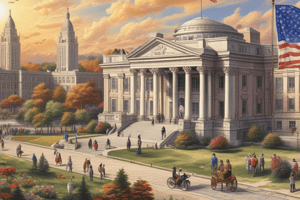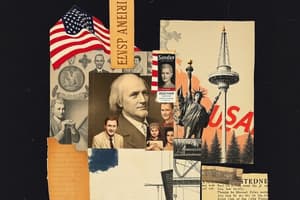Podcast
Questions and Answers
What was the primary purpose of the American System proposed by Henry Clay?
What was the primary purpose of the American System proposed by Henry Clay?
- To foster economic growth through internal improvements (correct)
- To expand the territory of the United States
- To promote international trade agreements
- To establish a national bank to regulate currency
Which event is most closely associated with the idea of Manifest Destiny?
Which event is most closely associated with the idea of Manifest Destiny?
- The Seneca Falls Convention
- The Missouri Compromise
- The Louisiana Purchase
- The Treaty of Guadalupe Hidalgo (correct)
What was a major effect of the Lowell Mills on American society?
What was a major effect of the Lowell Mills on American society?
- The rise of factory labor and women's employment (correct)
- The promotion of rural farming communities
- The decline of the textile industry
- Increased agricultural production in the South
Which Supreme Court case involved the issue of states' rights and the power of federal law?
Which Supreme Court case involved the issue of states' rights and the power of federal law?
What was the significance of John C. Calhoun in the context of the Nullification Crisis?
What was the significance of John C. Calhoun in the context of the Nullification Crisis?
What was the major consequence of the Kansas-Nebraska Act?
What was the major consequence of the Kansas-Nebraska Act?
In what way did Harriet Beecher Stowe impact American culture?
In what way did Harriet Beecher Stowe impact American culture?
Which was a key effect of the Second Great Awakening on American society?
Which was a key effect of the Second Great Awakening on American society?
What was the immediate outcome of the Battle of Gettysburg during the Civil War?
What was the immediate outcome of the Battle of Gettysburg during the Civil War?
Which of the following best describes the significance of the Erie Canal?
Which of the following best describes the significance of the Erie Canal?
Flashcards
American System
American System
A plan for economic development proposed by Henry Clay, focusing on internal improvements like roads and canals, a protective tariff to promote American industry, and a national bank to stabilize the currency.
Monroe Doctrine
Monroe Doctrine
A policy declared by President James Monroe stating that European powers could not colonize or interfere in the Western Hemisphere, effectively establishing the U.S. as a protector of the Americas.
Missouri Compromise
Missouri Compromise
A political agreement resolving the issue of slavery in new territories. Missouri was admitted as a slave state, while Maine was admitted as a free state, and slavery was prohibited north of the 36°30' parallel.
Erie Canal
Erie Canal
Signup and view all the flashcards
Market Revolution
Market Revolution
Signup and view all the flashcards
Trail of Tears
Trail of Tears
Signup and view all the flashcards
Jacksonian Democracy
Jacksonian Democracy
Signup and view all the flashcards
Nullification Crisis
Nullification Crisis
Signup and view all the flashcards
Manifest Destiny
Manifest Destiny
Signup and view all the flashcards
Compromise of 1850
Compromise of 1850
Signup and view all the flashcards
Study Notes
Era of Good Feelings/Market Revolution
- American System: Economic plan promoting national growth through infrastructure, tariffs, and a national bank. Key figures involved include Henry Clay.
- Henry Clay: A key political figure and advocate for the American System.
- James Monroe: President during the "Era of Good Feelings," notable for the Monroe Doctrine.
- John Quincy Adams: Sixth President of the United States; involved in foreign policy decisions.
- Anglo-American Accords: Agreements resolving boundary disputes between the US and Britain.
- Monroe Doctrine: Policy asserting US opposition to European colonization in the Americas.
- Missouri Compromise: Settlement addressing the issue of slavery's expansion into new territories.
- Infrastructure: National improvements in roads, canals (like the Erie Canal), and bridges fostered national unity.
- Erie Canal: A major canal connecting the Great Lakes to the Atlantic Ocean.
- National Road: An important overland route for travel and trade.
- The Talmadge Amendment: Proposed amendment to restrict the spread of slavery into Missouri.
- Second Great Awakening: Religious revival emphasizing personal conversion and social reform.
- The Lowell Mills: Early textile factories in Lowell, Massachusetts, significantly impacting industrialization.
- Robert Fulton: Inventor of the steamboat, greatly improved transportation.
- Eli Whitney: Invented the cotton gin, which revolutionized cotton production and slavery.
- Cotton Gin: Machine that separated cotton seeds from fibers, increasing cotton production significantly.
- Market Revolution: Transformation of the US economy from agrarian to industrial, driven by new inventions and infrastructure.
Jacksonian Era
- Nullification Crisis: Political struggle centered on states' rights to void federal laws.
- Force Bill: Legislation authorizing the use of military force to enforce federal laws.
- Trail of Tears: Forced removal of Native American tribes from their ancestral lands.
- John Marshall: Chief Justice of the Supreme Court during the early 19th century, shaped legal interpretation.
- Jacksonian Democracy: Political philosophy emphasizing increased participation by the common man in politics.
- John C. Calhoun: Prominent Southern politician, advocated for states' rights.
- The Bank War: Political conflict over the rechartering of the Second Bank of the United States.
- Whigs: Political party opposing Jacksonian Democrats.
- Democrats: Political party supporting Jackson's policies.
- Worcester v. Georgia: Supreme Court case affirming Native American sovereignty.
- Tariff Compromise: Agreement resolving the issue of tariffs and related conflicts.
Manifest Destiny
- James K. Polk: 11th President, championed westward expansion.
- The Oregon Trail: Important route for westward migration.
- Mormon exodus: Migration of Mormons west to Utah.
- Zachary Taylor: 12th President, involved in the Mexican-American War.
- Mexican Cession: Territory acquired from Mexico after the Mexican-American War.
- Treaty of Guadalupe Hidalgo: Treaty ending the Mexican-American War and establishing US-Mexico borders.
- 54-40 or Fight: Slogan referring to the US claim to the entire Oregon Territory.
- The Alamo: Site of a key battle in the Texas Revolution.
- Manifest Destiny: Belief that the US was destined to expand its territory and influence across North America.
- John O'Sullivan: Journalist who coined the term "Manifest Destiny."
- Henry David Thoreau: Transcendentalist writer and philosopher.
- On Civil Disobedience: Thoreau's essay advocating for civil disobedience against unjust laws.
- Transcendentalism: Philosophical movement emphasizing individualism, intuition, and nature.
- Grimke Sisters: Female abolitionists and advocates for women's rights.
- Elizabeth Cady Stanton: Leader in the women's rights movement.
- Seneca Falls Convention: 1848 convention advocating for women's rights.
- Declaration of Sentiments: Document at the Seneca Falls Convention outlining women's grievances.
Sectionalism
- Wilmot Proviso: Proposed amendment to prevent slavery from expanding into newly acquired territories.
- Dred Scott v. Sanford: Supreme Court decision denying citizenship to enslaved people and limiting Congress' power to regulate slavery.
- William Lloyd Garrison: Abolitionist leader who published "The Liberator".
- The Liberator: Abolitionist newspaper founded by William Lloyd Garrison.
- The American Anti-Slavery Society: Organization advocating for the abolition of slavery.
- Compromise of 1850: Series of laws addressing slavery's expansion into new territories.
- Kansas-Nebraska Act: Legislation allowing popular sovereignty to decide the issue of slavery in these territories.
- Fugitive Slave Law: Law requiring the return of runaway enslaved people.
- Bleeding Kansas: Violence and conflict over the issue of slavery in Kansas Territory.
- John Brown: Abolitionist who used violence to fight slavery.
- Brooks and Sumner Incident: Assault in the Senate reflecting the sectional tensions.
- Harriet Beecher Stowe: Author of "Uncle Tom's Cabin," a novel depicting the evils of slavery.
- Popular Sovereignty: Political doctrine permitting residents of a territory to decide on slavery issues.
- Frederick Douglass: Prominent African American abolitionist and orator.
- William Seward: US Secretary of State, worked on diplomatic and foreign policy matters.
- Lincoln-Douglas Debates: Series of debates between Lincoln and Douglas on the issue of slavery highlighted during the 1858 Illinois senatorial campaign.
- Quantrill: Confederate guerilla leader in Missouri during the Civil War.
- Free Soil Party: Anti-slavery political party.
- Gradualism: Approach to abolition advocating for a phased elimination of slavery.
- Abolitionism: Movement advocating for the immediate end of slavery.
- Uncle Tom's Cabin: Novel by Harriet Beecher Stowe that helped galvanize abolitionist sentiment.
Civil War
- Fort Sumter: Site of the first shots of the Civil War.
- Battle of Gettysburg: Major Union victory turning point of the Civil War.
- The 54th Massachusetts: Famous regiment of African American soldiers.
- Jefferson Davis: President of the Confederate States of America.
- Sherman's March to the Sea: Union military campaign across Georgia.
- U.S. Grant: Union General, crucial to winning the war.
- Battle of Vicksburg: Union victory giving them control of the Mississippi River.
- Robert E. Lee: Confederate General.
- Appomattox Court House: Site of Lee's surrender to Grant.
- Gettysburg Address: Lincoln's speech honoring the fallen soldiers.
- John Wilkes Booth: Assassinated President Lincoln.
- Abraham Lincoln: 16th President of the United States, leading the Union to victory.
- Anaconda Plan: Union strategy to blockade Southern ports and control the Mississippi River.
Studying That Suits You
Use AI to generate personalized quizzes and flashcards to suit your learning preferences.
Description
Explore the pivotal era in American history known as the Era of Good Feelings, marked by economic growth and national unity. Test your knowledge on key policies, influential figures like Henry Clay and James Monroe, and significant events such as the Monroe Doctrine and Missouri Compromise.




